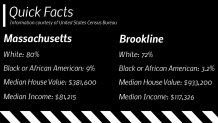After spending $11.3 million on racial discrimination settlements in the past few years, there is concern Brookline, Massachusetts, could be susceptible to paying out millions more.
Former firefighter Gerald Alston brought his federal lawsuit against Brookline to a close with $11 million of redress in October of 2021. It took 11 years.
In an exclusive interview with NBC10 Boston, Alston said he believes little has changed over the last decade to make the city a more racially harmonious place to work — even though it paid out as much as it did.
"I didn't change nothing," Alston told NBC10 Boston. "No, I don't think it's changed. Not at all."
Elected officials in Brookline, who overwhelmingly voted to approve the eight-figure settlement, were as candid as Alston in their assessments of what has not changed to improve racial harmony in the workplace.
"We shouldn't fool ourselves into thinking that because we put an end to that case, that another one couldn't come up tomorrow," said Raul Fernandez of the Brookline Select Board.
"I've seen nothing that would reasonably lead me to believe that structures and systems have changed such that this wouldn't happen again," said Town Meeting Member Deborah Brown.
In addition to Alston's settlement, two police officers settled with the town in the past few years — they both alleged racial discrimination where they worked.
The Alston case was the largest settlement. The most severe punishment stemming from that case fell on Lt. Paul Pender, Alston's supervisor, who was hit with a one-week suspension for unintentionally leaving a racial slur on Alston's voicemail.
That incident sparked Alston's racial discrimination complaint in 2010. The slur, Lt. Pender says, was directed at another driver in a moment of road rage.
"That's a perfect example of Brookline saying, 'Go stick yourself,'" Alston said. "They didn't do anything about it. They promoted him. I became a problem — they fired me."
In a written statement, Brookline's chief of diversity pointed to the following actions to improve the town’s workplaces based on what was learned from the settlements:
- revising the discrimination complaint process, a revision underway since 2019
- hiring a racial equity consultant
- anti-discrimination training in the workplace.
Additionally, members of Brookline Town Meeting, an elected body, have done away with non-disclosure agreements in the settlement process, with the hope a lack of secrecy will inspire greater accountability from Brookline's department heads, particularly as it relates to issues of racial discrimination. In a surprise move, the Select Board, another Brookline elected body, voted against the measure. Nonetheless, the measure had sufficient support to be enacted and the broad use of NDAs to silence discrimination whistleblowers is now prohibited.
"If we don't talk about our problems, we won't solve them," Fernandez said. "And if we're not the kind of place that's willing to talk about what's going wrong and to fix what's going wrong, why should we want people to come live here anyway? I mean, we have to be the kind of community that's going to be open in dialog about our failings."
We asked Anne Greenwald and Deborah Brown, town meeting members, if Brookline is progressive on issues of racial equality. They both said, “no”. This was after they led a yearlong fight to change the name of the Brookline school from a slave owner to a civil rights leader.

"Most organizations, if they have to spend $11 million and go through the public humiliation of a racial discrimination claim like that would feel a sense of urgency to change some systems -- not just tweak, but fundamentally look at what happened, what went wrong and introduce changes," said Brown.
"I feel like the more I’ve learned, the more it just seems like this has got to be a top priority for everything we do," said Greenwald.
Marty Rosenthal has been civil rights litigator for much of his career and has lived in Brookline his whole life.
He’s certain the rhetoric of some about racism in his town is grossly exaggerated—and the rhetoric is keeping diverse populations away, in his opinion, and driving out people working in public safety.
"You're basically telling outsiders who are people of color don't come here," Rosenthal said. "And in my view, that is the most important racial issue in Brookline: getting a more diverse population."
"What they’ve done – the people who are excessive(ly) anti-racist – they’ve hurt the morale in the police department… and we’ve documented that on the Police Reform Committee that I was on."
We asked Mr. Rosenthal if police and fire departments are racially harmonious places to work.
"I’d say relative to other places I believe that they are. My view is the town has worked very hard to do what you're talking about."
Rosenthal believes political rhetoric drove the large Alston settlement, not the law. He also insists the two police settlements were consistent with the practice of settling cases for a sum that is less than would have been the cost of litigation.
Nonetheless, all four Brookline elected officials in this story voted "yes" on the $11 million dollar Alston settlement.
The town shared the following statement with NBC10 Boston:
Key Documents
Alston Letter to Fire Chief
Alston Discrimination Lawsuit
Alston settlement agreement
Civil Service Commission Decision

